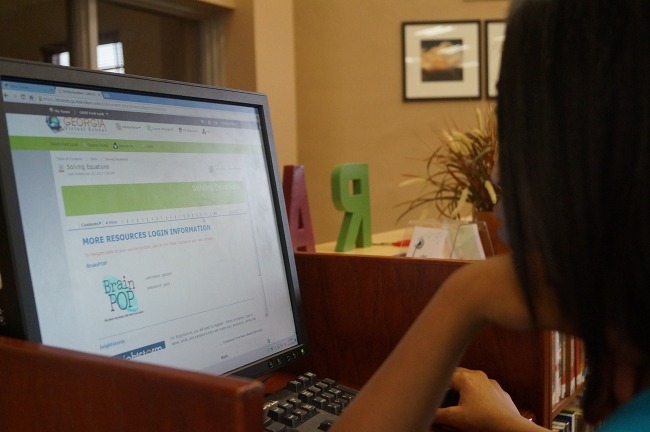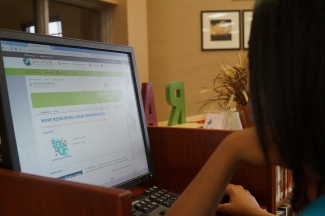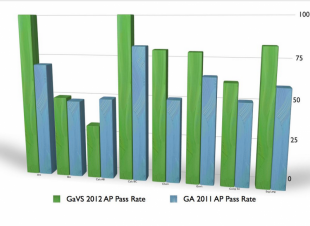By SUSANNA CONINE-NAKANO
Georgia Virtual School, an independent study program, grants middle and high school students the opportunity to take a class via online rather than a traditional classroom setting.
CCHS students can now take courses online instead of in traditional classrooms. Photo by Susanna Conine-Nakano.
“The teacher runs the class 100 percent online and communicates via online and telephone or internal chat. The curriculum is owned by the state, the teacher is paid by the state and we typically allow students this option who are requesting a course that we do not teach or offer, ” Associate Principal and GAVS facilitator Mary Thielman said.
The teacher instructs the class completely through the internet and communicates with the students through different mediums.
“I know the teachers do a really good job at being available 24/7. Part of the information when you sign up is providing your home phone number, your email and your parents email. I have never heard of a student not being able to get a hold of their teacher and getting feedback,” Thielman said.
Students can take a GAVS course as part of their regular schedule or as an add-on. If a students takes a GAVS course in their regular schedule, their block is spent in the media center with specialists supervising the student’s progress.
“Even though it isn’t a deal breaker, if the student doesn’t have a computer at home it is difficult to get the course work done,” Thielman said.
CCHS has approximately a half dozen students enrolled in GAVS at the moment. According to Thielman, the program is best for students who are self-motivated, have a high level of concentration, are organized and punctual.
“I typically look at the students Grade Point Average, the rigor of their schedule and have a conversation with the student and their counselor or the student and the teacher,” Thielman said.
The GAVS curriculum is more vigorous than what most students expect and class work deadlines are very strict with little leeway.
“We have had some kids sign up for it and then realize that it’s whole lot more work than they ever thought it was going to be, and they ask to be dropped from the course,” Thielman said. “There are certain dates by which you have to sign up and by which you can drop, and if you are not committed and dedicated then it won’t be a positive experience.”
Student’s experiences have been mixed. CCHS freshman Evan Newman took the Acc. Math I course through GAVS and felt it was not the best way for him to learn the material.
“I think the primary thing is that if you didn’t understand something in the material, there isn’t a teacher there to explain it. They do have internet sessions (along with emailing your teacher) where you can ask questions to the teacher, but that is only for 30 minutes out of the whole week. That wasn’t enough for me, ” Newman said.
Other students, like sophomore Zehadi Alam, enjoyed GAVS as a medium for learning. Alam feels his teacher was efficient in responding to questions. He also feels he benefited from the one on one learning experience.
“What I find in traditional classrooms is that they’re not talking to you directly, when you are looking at a lecture on the online course, you feel a direct connection between the video lecture and yourself,” Alam said. “It feels like more one on one and you don’t get distracted so easily by external factors. Plus, you can always refer back to the videos and you can’t do that with a traditional class.”
Based on statistics on the GAVS official website, students who take AP classes through GAVS do better on numerous AP exams.
According to the GAVS official website, students who take GAVS courses do better on the EOCT than students in a traditional classroom setting. Students who take the Advance Placement test results vary. There are a select number of classes that students do better on the AP test by being in the traditional classroom rather in the GAVS program such as AP Calculus AB, AP European History and AP Statistics.
“The part that you can never factor in is the stick-to-itiveness that a student has to stay with the pace and tempo. Sometimes how well you do has nothing to do with how bright you are or how hard you work,” Thielman said.
At this time, if the student takes a GAVS course as a part of their regular schedule, the fees are paid by the school district. If the class is an add-on to their regular schedule, the financial responsibility falls on the student and his or her family. The GAVS courses can cost from $300 to $600 depending on the course and the length of the course.
“For some people, spending $300 to $600 for a course is worth it because it could help with a scholarship or what else. There are all sorts of possibilities,” Thielman said.
GAVS curriculum is regulated by the Georgia Department of Education causing it to be more rigorous than traditional classes. The GAVS’s highly qualified teachers are also employed by the Georgia Department of Education.The grading system is slightly different than the one at CCHS. There still is an 80 percent category for summative and formative assignments, but test, projects, classwork and ect. weigh differently. Students are still required to take the EOCT for certain courses or a final which counts as 20 percent of their grade.
“It is not Clarke County curriculum and Clarke County teachers, so you live within the constraints of GAVS,” Thielman said.
Though only a handful of students at CCHS are enrolled in the program, Thielman believes there will be an increasement of enrollment for GAVS courses in the future due to the advancement of technology.
“I think that whole timeliness of the whole electronic medium to learn is increasing and I am suspecting that the conversations (about GAVS) are happening more and more in registration process this year. I think you will see a movement in the distance learning direction over time,” Thielman said.
Some states are moving towards offering more virtual courses to students. Alabama, Florida and Michigan are just a few states that require high school students to take virtual courses before graduating. While other states are strongly encouraging students to participate in virtual courses.
“There are conversations in Georgia on what role will distance learning will play. I think if you are in the sixth and seventh grade now, then it will be a common thing in high school. Things have changed. You can hear the drum beat of things changing even in the school and the district.” Thielman said.
More from Susanna Conine-Nakano


